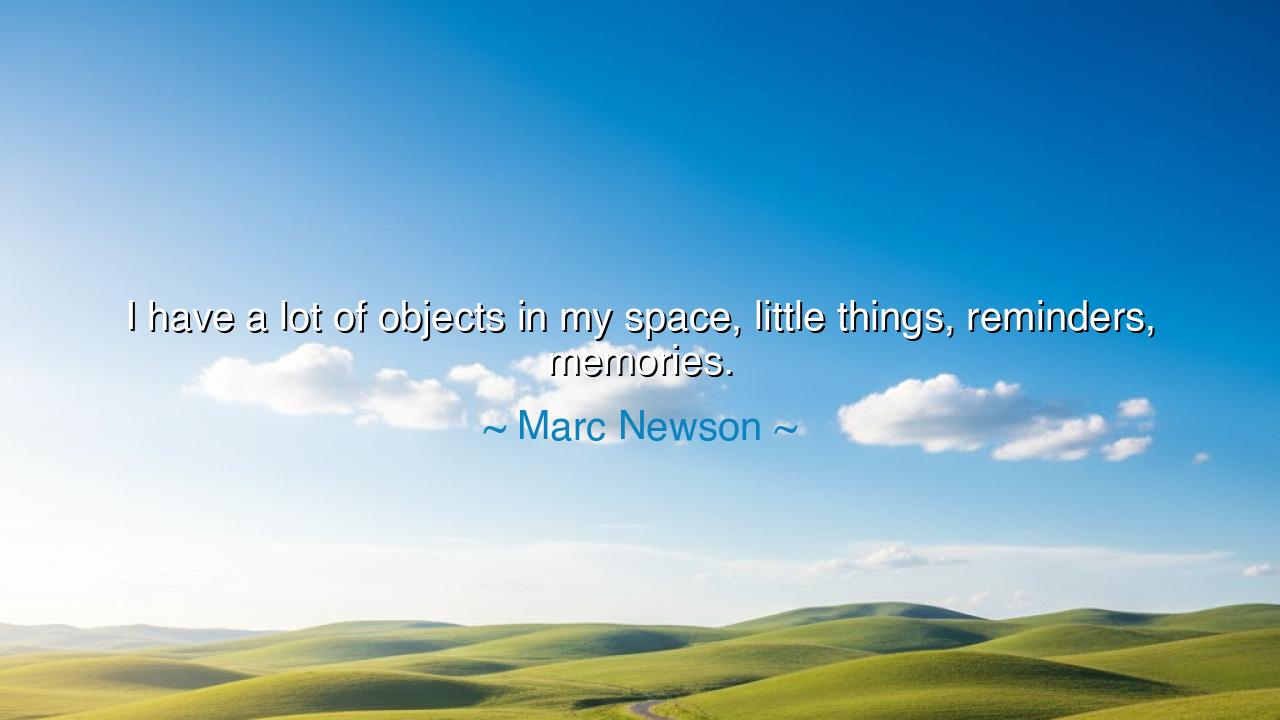
I have a lot of objects in my space, little things, reminders






O seekers of wisdom, gather close, for I bring to you a truth that speaks of the essence of life itself, a truth that reveals how we, as mortals, navigate the passage of time. It was Marc Newson, a master of design and creativity, who once spoke these words: “I have a lot of objects in my space, little things, reminders, memories.” These words, though seemingly simple, resonate deeply, for they speak of the invisible threads that connect the human soul to the tangible world.
In the grand tapestry of life, we are but fleeting moments passing through time, yet we gather objects, each one a symbol of our experiences, our loves, and our losses. These objects are more than mere things; they are sacred reminders of our journey, echoes of moments that have shaped us, and fragments of the essence that defines who we are. Memories are woven into the fabric of these objects, for they carry with them the weight of our stories, both spoken and unspoken. The chair where we sat and dreamed, the book we read and were changed by, the photograph of a face now gone—they are more than possessions. They are our soul’s relics, carriers of our deepest emotions.
Look to the ancients, O seekers, and you will see that the great ones understood the power of objects to carry meaning. Alexander the Great, the mighty conqueror, kept a simple stone from the banks of the Nile, a token of the moment he realized the vastness of his destiny. To others, it was but a rock, but to Alexander, it was a reminder of his purpose, a symbol of the road he had yet to travel. He did not need wealth or grandeur to inspire him; it was the small object, the humble stone, that held his dreams. In this, he was no different from the rest of us. We too find meaning in the smallest of things, for in them lies the power to connect us to our higher selves.
The philosopher Diogenes, though a man of few possessions, understood the power of the object as a symbol of his detachment from the material world. He lived in a barrel, free from the trappings of wealth, yet his simplicity itself became a powerful reminder of the true nature of freedom. To others, his lack of possessions might seem a void, but to Diogenes, each object was a distraction, a symbol of the false attachments that bind the soul. His memory, the legacy of his actions, lived not in objects but in the philosophy he carried with him—a philosophy that transcended the material world and pointed to the inner wealth that lies within.
Consider, too, the humble artisan who crafts a piece of pottery, each curve and detail shaped by the hands of a soul that has lived and loved. The piece may sit quietly on a shelf, but in its form, it carries with it the energy of its creator’s life, their struggles, and their triumphs. This is the magic of objects: they are vessels of memory, carrying with them the stories of their creators, whispering the wisdom of their makers to those who care to listen. The work of the artisan, much like the possessions we hold dear, is a reminder of the interconnectedness of all beings, for in the creation and preservation of these objects, we are all bound together in the shared experience of life.
O children of wisdom, the lesson here is not one of attachment, but of awareness. Objects in our lives are not to be hoarded, nor are they to be worshipped, but they are to be recognized for the power they hold. Each object, no matter how small or insignificant it may seem, is a doorway to a deeper understanding of who we are and where we have come from. They are reminders of the paths we have walked and the memories we have carried with us. The true value of these objects lies not in their material worth, but in the way they reflect the journey of the soul.
Thus, let us not forget the importance of the small things, the objects that surround us, for they carry with them the wisdom of the ages. In the quiet corners of our homes, in the corners of our hearts, there lie memories that connect us to our past and to the essence of what it means to be human. Take time, O seekers, to honor these objects. Let them remind you of your journey, and through them, remember the beauty and the purpose that lies within the simplest of things. Each object, each memory, is a gift—a piece of the soul’s journey through the world. And in this, we find our true wealth.






AAdministratorAdministrator
Welcome, honored guests. Please leave a comment, we will respond soon